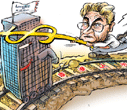Domestic
Touchmedia's big plans for taxi ad
By Zhang Jiawei (chinadaily.com.cn)
Updated: 2009-07-03 16:31
Touchmedia, Shanghai-based in-taxi interactive media company, has been seeing great success lately, winning awards and making large profits, despite the global economic downturn.
The company successfully completed its third round of financing worth 100 million yuan ($14.6 million) at the end of May to boost development in research and development as well as in second-tier cities. If the economy recovers, the company is expected to be listed in 2010, sina.com.cn reported citing Micky Fung, founder and CEO of Touchmedia.
Touchmedia had reportedly installed more than 15,000 interactive screens in Shanghai, Beijing, Guangzhou and Shenzhen and cooperated with many taxi companies in 10 cities in less than three years.
The numbers of the taxis that had a deal with Touchmedia in Beijing and Shanghai accounted for 70 percent and 95 percent of the total respectively, according to the magazine Chinese Venture.
Most new media companies expect 15 percent of their clients to come back, but with Touchmedia, 80 percent of customers will cooperate with the company again within three months, Fung was quoted by China Business Journal as saying.
|
||||
Touchmedia has long been heavily engaged in helping build public support for events as diverse as Sichuan Earthquake Relief, the 2008 Beijing Olympic Games, the 2010 World Expo, as well as charities such as 1KG More, Jet Li's One Foundation and many others.
"Up to a third of our video content and all of the sidebar areas on our screens are given over to public information on what's happening in the city. And for the main interactive flash program channels, the most popular one currently is probably that for the 2010 Expo," Fung said.
Touchmedia has been creating interactive community service microsites for the 2010 Expo since last July, according to the company. The company announced it would enhance its site from July with new features on the history of Expos, introducing the amazing evolution of the World Expo back to 1851, which will be juxtaposed with typical factors representing Shanghai.
The company has been developing a new service with a city map which can provide instant guidance for visitors from all over the world during the Expo, according to the company's material.
"It's a useful and convenient way to find out about the Expo when I am sitting in a taxi with nothing to do," said Li Rongjue, a 27-year-old office lady working in Jingan District, Shanghai.
"It's helpful, not just for local people but also for tourists," said Zhong Huiyang, a 34-year-old hotel manager.
But despite the ambitious developing plan, there are also problems lying in the way of the company's development.
According to a survey carried out in Beijing by Chinese Venture, some taxi companies forced their drivers to install a screen in their vehicles, requiring the drivers themselves to fork over a deposit of between 800 to 1,000 yuan to ensure the safety of the screen which cost Touchmedia 2,000 to 3,000 yuan each.
To add to the drivers' resentment, the extra screen consumes a lot of electricity, which could dramatically shorten the life span of the car's battery. The magazine said 90 percent of taxi drivers chose to shut off the screen to save electricity as a result.
Fung worried that taxi drivers may not let passengers see the company's products when they thought they could not get enough benefit, China Business Journal reported
Passengers may also become angry with drivers when they are constantly bothered by the advertisements on the screen in front of them, according to the magazine. Compared with video advertisements, those in magazines were shown to be much more acceptable to passengers, the magazine reported.
Judging from issues like these, there is still a long road ahead for Touchmedia if it wants to monopolize the in-taxi advertising market in the country's big cities, despite its recent success.












